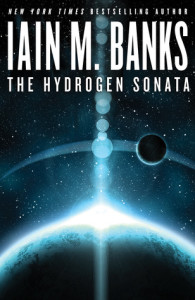 The Gzilt, a humanoid civilization at the galaxy’s highest levels of development, are about to Sublime — to leave corporeal reality and join a higher realm, a heavenly, information-dense parallel universe to which most civilizations eventually retire. It’s a time that ought to be spent entirely in contemplation, setting last things right, a bit of partying, some speechifying, and general preparation for an awesome event. And it is, until politicians, the military and an ancient religion get involved.
The Gzilt, a humanoid civilization at the galaxy’s highest levels of development, are about to Sublime — to leave corporeal reality and join a higher realm, a heavenly, information-dense parallel universe to which most civilizations eventually retire. It’s a time that ought to be spent entirely in contemplation, setting last things right, a bit of partying, some speechifying, and general preparation for an awesome event. And it is, until politicians, the military and an ancient religion get involved.
That’s the background to The Hydrogen Sonata, Iain M. Banks’s latest science-fiction novel set in what he has named The Culture. It is the ninth Culture novel in 25 years, and it is as complex, awe-inspiring, humorous and action-packed as anything Banks has written. (This story is set about 1,500 years before the one in Banks’s previous book Surface Detail.)
The Gzilt were one of the civilizations involved in the planning and creation of The Culture some 10,000 years ago, but in the end didn’t join. They are ruled by a clique of hereditary politicians, in league with the military, of which everyone is at least a nominal or reserve member.
One thing that happens when a civilization is preparing to Sublime is that representatives of other civs start dropping by. Less-developed societies hope to salvage technology left lying around, partners come to offer congratulations, Presences from the Other Side appear to help in the transition, and old friends and rivals drop by to clean the slate, bury the hatchet and fess up to past transgressions. As the book opens, one such ship from the remnant of the Gzilts’ mentors the long-Sublimed Zihdren, is brutally wiped out in an unprovoked attack by a Gzilt ship because it apparently was carrying some information about the Gzilts’ foundational religious text, The Book Of Truth.
A Culture ship, Mistake Not . . . notices the violent act from far away, and the plot thickens.
A Gzilt musician, Vyr Cossont, is drawn into the intrigue because 20 years ago she met a fellow named QiRia, rumored to be the oldest humanoid in The Culture. He may know this deadly secret about that religious text. She is enlisted to help track QiRia down, first by a Gzilt military unit, then by Mistake Not . . . after she barely survives the destruction of that military unit in a surprise internecine attack.
Laid out like that the plot is fairly simple. Of course, what counts is the way the story is told, and Banks is a master story-teller. There are dozens of characters, mostly Gzilt humans, the godlike Minds, intelligences that run the Culture, largely through its ships, and the ships’ enigmatic avatars, particularly one named Berdle, Mistake Not…‘s avatar who escorts and protects Cossont. There are a couple of pulse-pounding battle set-pieces, and a lot of captivating descriptive passages — bizarrely sculpted alien worlds, decade- and world-spanning parties thrown by people getting ready for the approaching Subliming, and the unfathomable internal mindscapes of the ships’ Minds.
Sound and music play a major role in The Hydrogen Sonata, whose title refers to an impossibly complex atonal work for an equally complex instrument that Cossont is determined to play perfectly before the Subliming. It is one representation of the theme represented by Subliming, that of losing one’s identity to or being subsumed by something larger than oneself. It’s echoed many times, mostly in settings involving water or brutal, crushing sound, and once in an inverted reflection when we visit an entire mountain covered by a self-sustaining fountain not of water but of sand, the life project of an eccentric drone.
In a book of equal parts jaw-dropping wonder and world-shattering violence, relief is offered by the Ships: their names themselves and the droll and witty dialog between and among them as they go about debating their course of action and concocting rationalizations for once again meddling in the affairs of another civilization.
High concepts to ponder, natural and constructed wonders to marvel at, plus intrigue, mystery and action to keep you turning the pages; The Hydrogen Sonata is yet another Banks novel to savor.
(Orbit, 2012)
